托福雅思15种语法
雅思写作语法大全
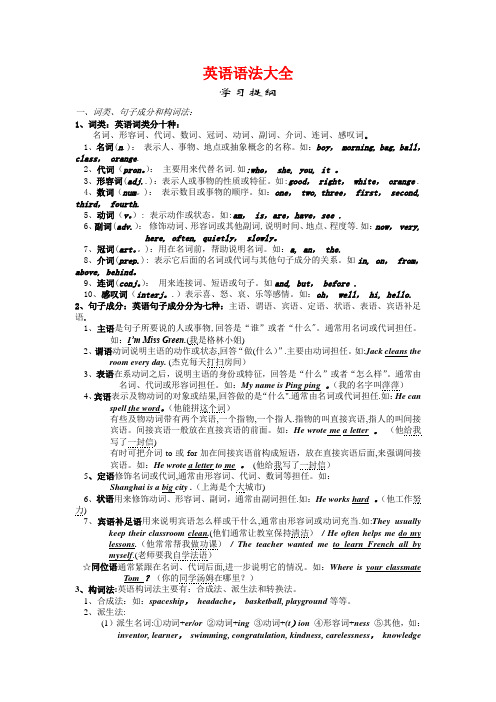
英语语法大全学习提纲一、词类、句子成分和构词法:1、词类:英语词类分十种:名词、形容词、代词、数词、冠词、动词、副词、介词、连词、感叹词。
1、名词(n.):表示人、事物、地点或抽象概念的名称。
如:boy, morning, bag, ball,class, orange.2、代词(pron。
):主要用来代替名词.如:who, she, you, it 。
3、形容词(adj..):表示人或事物的性质或特征。
如:good, right, white, orange .4、数词(num。
):表示数目或事物的顺序。
如:one, two, three, first, second, third, fourth.5、动词(v。
): 表示动作或状态。
如:am, is,are,have,see .6、副词(adv.):修饰动词、形容词或其他副词,说明时间、地点、程度等.如:now, very,here, often, quietly, slowly。
7、冠词(art。
):用在名词前,帮助说明名词。
如:a, an, the.8、介词(prep.): 表示它后面的名词或代词与其他句子成分的关系。
如in, on, from,above, behind。
9、连词(conj。
):用来连接词、短语或句子。
如and, but, before .10、感叹词(interj。
.)表示喜、怒、哀、乐等感情。
如:oh, well, hi, hello. 2、句子成分:英语句子成分分为七种:主语、谓语、宾语、定语、状语、表语、宾语补足语.1、主语是句子所要说的人或事物,回答是“谁”或者“什么"。
通常用名词或代词担任。
如:I’m Miss Green.(我是格林小姐)2、谓语动词说明主语的动作或状态,回答“做(什么)”.主要由动词担任。
如:Jack cleans theroom every day. (杰克每天打扫房间)3、表语在系动词之后,说明主语的身份或特征,回答是“什么”或者“怎么样”。
雅思作文高级句型
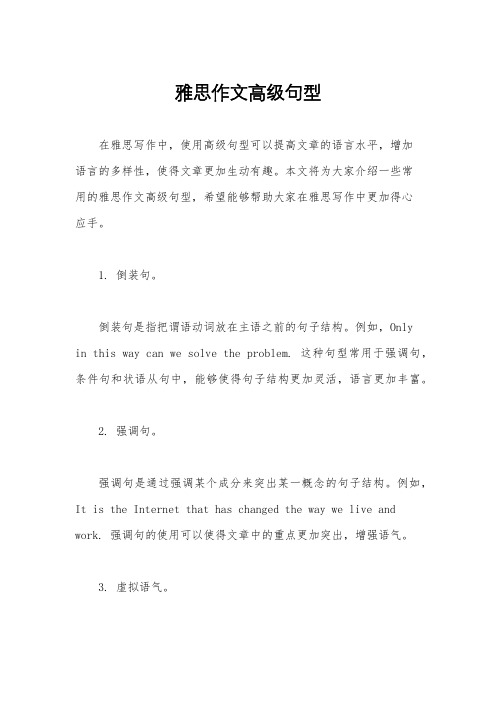
雅思作文高级句型在雅思写作中,使用高级句型可以提高文章的语言水平,增加语言的多样性,使得文章更加生动有趣。
本文将为大家介绍一些常用的雅思作文高级句型,希望能够帮助大家在雅思写作中更加得心应手。
1. 倒装句。
倒装句是指把谓语动词放在主语之前的句子结构。
例如,Onlyin this way can we solve the problem. 这种句型常用于强调句,条件句和状语从句中,能够使得句子结构更加灵活,语言更加丰富。
2. 强调句。
强调句是通过强调某个成分来突出某一概念的句子结构。
例如,It is the Internet that has changed the way we live and work. 强调句的使用可以使得文章中的重点更加突出,增强语气。
3. 虚拟语气。
虚拟语气是指用来表示假设、愿望、建议等情况的语气。
例如,If I were you, I would take the opportunity. 虚拟语气的使用可以使得文章更加丰富多彩,增加语言的层次感。
4. 比较句。
比较句是用来表示两者之间的比较关系的句子结构。
例如,The more we practice, the better we will become. 比较句的使用可以使得文章更加丰富多样,增加语言的灵活性。
5. 假设句。
假设句是用来表示假设情况的句子结构。
例如,If I had known, I would have helped. 假设句的使用可以使得文章更加生动有趣,增加语言的表现力。
6. 值得一提的是,以上所列的高级句型并不是孤立存在的,它们可以结合在一起使用,使得文章的语言更加丰富多彩。
同时,在使用高级句型的过程中,要注意句子的结构和语法的准确性,避免出现错误。
7. 总之,雅思作文中的高级句型可以帮助我们提高文章的语言水平,增加语言的多样性,使得文章更加生动有趣。
因此,在备考雅思写作的过程中,我们应该多加练习,熟练掌握这些句型的使用,从而在考试中取得更好的成绩。
雅思作文语法
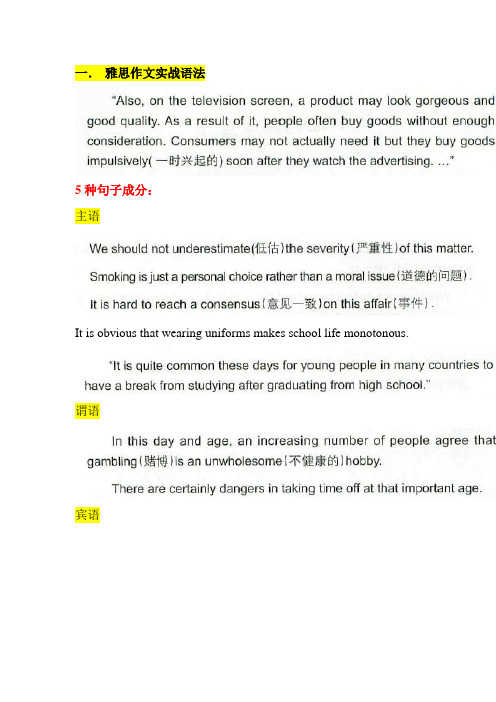
一.雅思作文实战语法5种句子成分:主语It is obvious that wearing uniforms makes school life monotonous.谓语宾语定语状语补语(mainly 宾补in IELTS writing)Verb + noun+noun/ adj.Find/ make/ render例句The graduates find the job market frustrating because of the economic recession.Some individuals are concerned the Internet will make/ renderinternational tourism obsolete.同位语(名词后面跟一个短语,解释说明这个名词)*Shopping, a necessary part of life, is increasingly time-consuming due to multiplied options available to consumers.*Job satisfaction, a very important part of an employee’s sense of wellbeing, can be promoted in most jobs.3种句子:简单句:并列句:主谓宾+主谓宾——and/ but/ or复杂句:主谓宾+主谓宾——更复杂的连词表示不同的关系NOTE:写好最基础的复杂句7种需要避免的错误1.Employee can benefit more from telecommuting thanemployer.2.*Work at home using modern technology can greatlyenhance our efficiency.*The problems that are created by environmental contamination is very hard to resolve.*In present-day society, cultures were becoming very similar.3. Intelligent students should not be treated different by their teachers.4. *Countries should pay attention on the disadvantages globolisation may create.Reason for…/ solution to…* The Internet has instead of teachers in many classrooms.5. Some parents do not obey traffic rules himself.6. Some people think the Internet only has positive impact, other people think it also has negative influence on our lives.7. There are a great many children think the main purpose of education should be to afford them pleasure and enjoyment.6种特殊句式1)句首状语提前2)句中插入短语*Attitude, after all, is essential for a student’s academic performance.Feeling about one’s job must reflect how an individual feels about his or her life, and because of this, job satisfaction is indeed very important.3)倒装句4)强调句It is the suits that make a chi-pao special.It is the traditions in Beijing that attract many foreign tourists.5)虚拟语气6)Be+of+抽象名词常跟的抽象名词有:Use/ importance/ help/ value/ interest/ significance/ necessity/ quality等。
雅思常用语法总结

雅思常用语法总结雅思考试中常用的语法总结如下:1. 时态:包括一般现在时、一般过去时、现在进行时、过去进行时、将来时、过去将来时等。
时态的正确使用是非常重要的,特别是在写作和口语表达中。
2. 被动语态:被动语态用于强调动作的接受者和动作的重要性。
被动语态的形式为“助动词be + 过去分词”,常用的助动词有am, is, are, was, were等。
3. 条件句:条件句用于表达假设、可能性、推测等。
包括三种类型:零条件句(零条件句表示一般事实)、一般条件句(表示现在或将来的情况)、虚拟条件句(表示与现实相反的假设或不可能实现的情况)。
4. 从句:从句是一个句子中的一部分,具有主语和谓语,可做其他句子的主语、宾语、状语等。
常见的从句包括名词性从句(作主语、宾语、表语等)、定语从句(修饰名词)、副词从句(修饰动词、形容词、副词等)。
5. 并列结构:并列结构用于连接两个或多个相同重要性的句子,可以使用连词and, but, or等。
并列结构使句子更加流畅和有逻辑性。
6. 符合最佳用法:在雅思写作中,使用符合最佳用法是非常重要的。
这包括使用适当的连接词、平衡句子结构和长度、使用多样的句型和长句,并在表达观点时提供足够的支持和证据。
7. 倒装句:倒装句的语序颠倒是为了强调特定的信息或实现平衡和连贯。
常见的倒装情况包括完全倒装(谓语动词位于主语之前)、部分倒装(助动词位于主语之前)和否定倒装(否定词位于句首)。
8. 间接引语:间接引语用于转述别人的话或思想。
常见的引述动词包括say, tell, ask等。
在使用间接引语时,需要注意时态的转换和引号的使用。
这些是雅思考试中常用的语法要点总结,合理运用这些语法规则可以提高语言表达的准确性和流利度。
同时,还需要多加练习,掌握常用的语法用法。
雅思英语语法
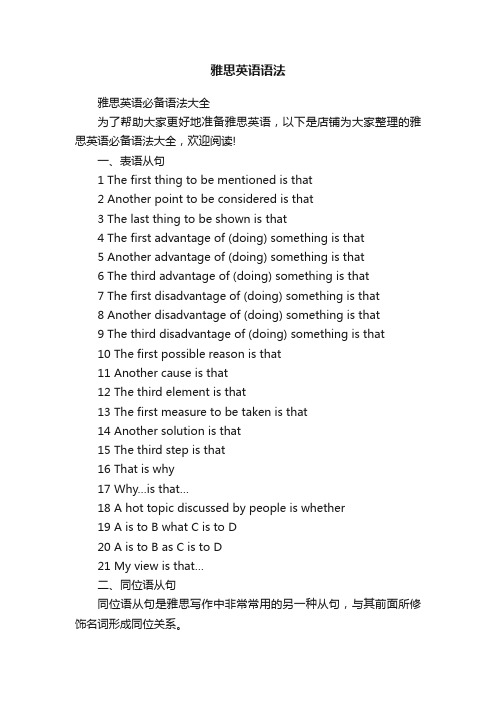
雅思英语语法雅思英语必备语法大全为了帮助大家更好地准备雅思英语,以下是店铺为大家整理的雅思英语必备语法大全,欢迎阅读!一、表语从句1 The first thing to be mentioned is that2 Another point to be considered is that3 The last thing to be shown is that4 The first advantage of (doing) something is that5 Another advantage of (doing) something is that6 The third advantage of (doing) something is that7 The first disadvantage of (doing) something is that8 Another disadvantage of (doing) something is that9 The third disadvantage of (doing) something is that10 The first possible reason is that11 Another cause is that12 The third element is that13 The first measure to be taken is that14 Another solution is that15 The third step is that16 That is why17 Why…is that…18 A hot topic discussed by people is whether19 A is to B what C is to D20 A is to B as C is to D21 My view is that…二、同位语从句同位语从句是雅思写作中非常常用的另一种从句,与其前面所修饰名词形成同位关系。
托福雅思写作高分语法规则
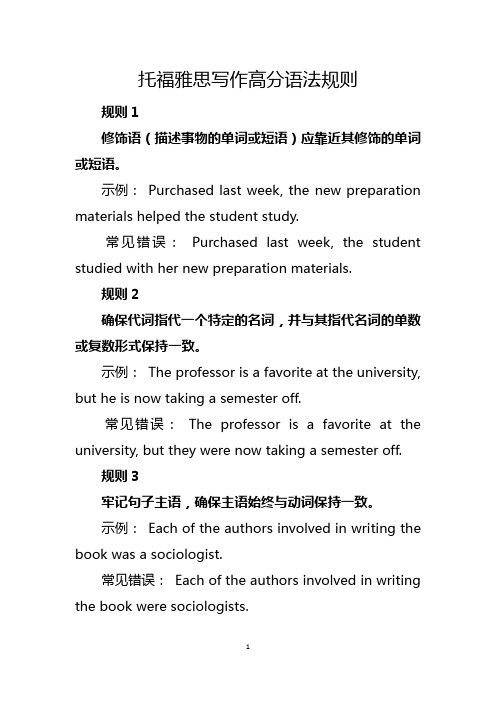
托福雅思写作高分语法规则规则1修饰语(描述事物的单词或短语)应靠近其修饰的单词或短语。
示例:Purchased last week, the new preparation materials helped the student study.常见错误:Purchased last week, the student studied with her new preparation materials.规则2确保代词指代一个特定的名词,并与其指代名词的单数或复数形式保持一致。
示例:The professor is a favorite at the university, but he is now taking a semester off.常见错误:The professor is a favorite at the university, but they were now taking a semester off.规则3牢记句子主语,确保主语始终与动词保持一致。
示例:Each of the authors involved in writing the book was a sociologist.常见错误:Each of the authors involved in writing the book were sociologists.规则4当一个句子中存在两个或多个并列成分时,应使用同类语法形式。
示例:The teacher thought he was a good student because he turned in his papers on time, tested well on exams and appeared enthusiastic.常见错误:The teacher thought he was a good student because he turned in his papers on time, tested well on exams and his enthusiasm was high.规则5当主语是动作的执行者时,选择主动语态(而非被动语态)。
雅思作文常用句型15个
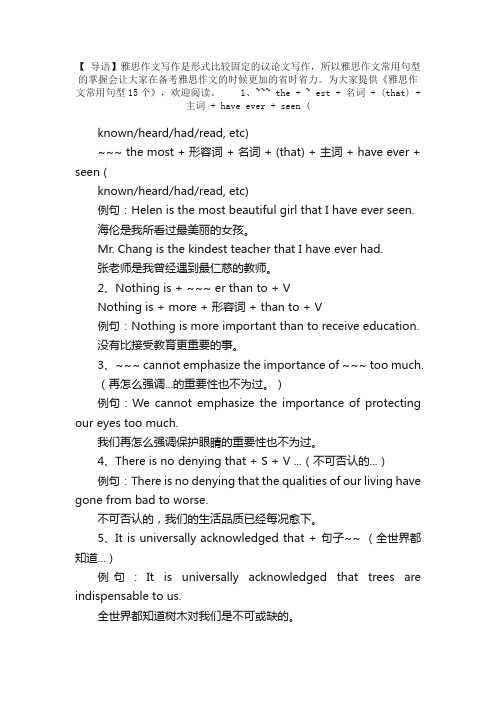
【导语】雅思作文写作是形式比较固定的议论文写作,所以雅思作文常用句型的掌握会让大家在备考雅思作文的时候更加的省时省力。
为大家提供《雅思作文常用句型15个》,欢迎阅读。
1、~~~ the + ~ est + 名词 + (that) +主词 + have ever + seen (known/heard/had/read, etc)~~~ the most + 形容词 + 名词 + (that) + 主词 + have ever + seen (known/heard/had/read, etc)例句:Helen is the most beautiful girl that I have ever seen.海伦是我所看过最美丽的女孩。
Mr. Chang is the kindest teacher that I have ever had.张老师是我曾经遇到最仁慈的教师。
2、Nothing is + ~~~ er than to + VNothing is + more + 形容词 + than to + V例句:Nothing is more important than to receive education.没有比接受教育更重要的事。
3、~~~ cannot emphasize the importance of ~~~ too much.(再怎么强调...的重要性也不为过。
)例句:We cannot emphasize the importance of protecting our eyes too much.我们再怎么强调保护眼睛的重要性也不为过。
4、There is no denying that + S + V ...(不可否认的...)例句:There is no denying that the qualities of our living have gone from bad to worse.不可否认的,我们的生活品质已经每况愈下。
托福考试必备托福英语语法整理

托福考试必备托福英语语法整理托福考试必备托福英语语法参与托福考试必备的,英语语法学问点,趁现在就把握它吧。
下面是学习啦我给大家整理的托福英语语法,供大家参阅!托福英语语法:一般现在时的用法1)、常常性或习惯性的动作,常与表示频腮度的时间状语连用。
时间状语:every, sometimes, at, on SundayI leave home for school at 7 every morning.2)、客观真理,客观存在,科学事实。
The earth moves around the sun.Shanghai lies in the east of China.3)、表示格言或警句中。
Pride goes before a fall. 骄者必败。
留意:此用法假如消失在宾语从句中,即使主句是过去时,从句谓语也要用一般现在时。
例:Columbus proved that the earth is round..4)、现在时刻的状态、力量、性格、共性。
I dont want so much.Ann Wang writes good English but does not speak well.比较:Now I put the sugar in the cup.I am doing my homework now.第一句用一般现在时,用于操作演示或指导说明的示范性动作,表示言行的瞬间动作。
再如:Now watch me,I switch on the current and stand back. 其次句中的now是进行时的标志,表示正在进行的动作的客观状况,所以后句用一般现在时。
托福英语语法:一般过去时的用法1)、在确定的过去时间里所发生的动作或存在的状态。
时间状语有:yesterday, last week, an hour ago, the other day, in 1982等。
Where did you go just now?2)、表示在过去一段时间内,常常性或习惯性的动作。
15个托福(TOEFL)考试语法问题总结
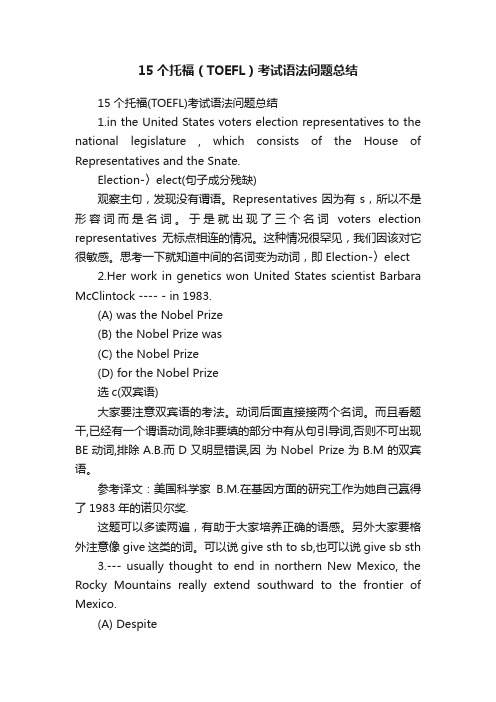
15个托福(TOEFL)考试语法问题总结15个托福(TOEFL)考试语法问题总结1.in the United States voters election representatives to the national legislature , which consists of the House of Representatives and the Snate.Election-〉elect(句子成分残缺)观察主句,发现没有谓语。
Representatives因为有s,所以不是形容词而是名词。
于是就出现了三个名词voters election representatives无标点相连的情况。
这种情况很罕见,我们因该对它很敏感。
思考一下就知道中间的名词变为动词,即Election-〉elect2.Her work in genetics won United States scientist Barbara McClintock ---- - in 1983.(A) was the Nobel Prize(B) the Nobel Prize was(C) the Nobel Prize(D) for the Nobel Prize选c(双宾语)大家要注意双宾语的考法。
动词后面直接接两个名词。
而且看题干,已经有一个谓语动词,除非要填的部分中有从句引导词,否则不可出现BE动词,排除A.B.而D又明显错误,因为Nobel Prize为B.M的双宾语。
参考译文:美国科学家B.M.在基因方面的研究工作为她自己赢得了1983年的诺贝尔奖.这题可以多读两遍,有助于大家培养正确的语感。
另外大家要格外注意像give这类的词。
可以说give sth to sb,也可以说give sb sth3.--- usually thought to end in northern New Mexico, the Rocky Mountains really extend southward to the frontier of Mexico.(A) Despite(B) To be(C) While(D) However选c(连词)分析:A.despite 为介词,后面要加名词形式的东东,e.g.Despite usually being thought to end in ...而这里的thought 是过去分词,不是动名词,所以不对。
雅思口语语法知识点总结

雅思口语语法知识点总结一、一般现在时:一般现在时表示经常性或习惯性的动作,或陈述现在的事实、真理、心得体会等。
1. 关于第三人称单数形式,一般动词加s。
例如:She goes to school every day.2. 并不是所有单词在加s或es,不规则变化。
例子:I go to school every day.二、一般过去时:一般过去时表示过去某个时间发生的动作或已经完成的动作。
1. 一般动词变化为过去式。
例如:I went to school yesterday.2. 动词to be的过去式。
例如:He was at home yesterday.三、现在进行时:现在进行时表示现在进行的动作。
1. 动词to be的现在进行时。
例如:He is playing basketball now.2. 现在分词短语。
例如:She is studying in her room.四、过去进行时:过去进行时表示在过去某个时间正在进行的动作。
1. 动词to be的过去进行时。
例如:She was cooking dinner when I arrived home.2. 过去分词短语。
例如:We were watching TV at 8 o'clock last night.五、一般将来时:一般将来时表示将来某个时间要发生的动作或已经预定好的事情。
1. 动词will。
例如:I will visit my family next week.2. 动词going to。
例如:She is going to start a new job next month.3. 现在进行时。
例如:We are leaving for the airport at 3 o'clock.六、现在完成时:现在完成时表示过去某个时间开始,一直持续到现在的动作或者发生的动作与现在相关。
1. 动词have/has。
雅思写作最实用语法总结(全是拿分点)

雅思写作最实用语法总结(全是拿分点)雅思写作最实用语法总结时态问题:在写作中,我们需要灵活运用四种时态:一般现在时,现在进行时,现在完成时和一般将来时。
使用一般现在时时,需要注意第三人称单数的用法。
例如,打工对一个人的将来事业有深远的影响,可以表达为Taking part-time XXX。
而现在进行时则表示逐渐的过程,例如经济正在迅速发展,可以表达为XXX使用现在完成时时,需要注意常用的搭配,如In recent years。
In the past decades等。
例如,最近几年,科技极大地改变了人们的生活,可以表达为In recent years。
XXX一般将来时则表示将要发生的事情,例如电脑将会在教育过程中起越来越关键的作用,但是它们绝对不能在教室中取代老师的地位,可以表达为XXX。
but it is not possible that they could replace teachers in the classroom。
语态问题:在写作中,我们应该以主动语态为主,并搭配被动语态。
常见的被动语态结构包括be done、am、is、are done、is being done、have/has been done和will be done。
例如,我们应该优先考虑教育,rities should be given to XXX。
词法问题:在写作中,我们需要注意名词的使用。
泛指的名词要用复数,不加冠词。
不可数名词则使用原型。
例如,学生应该记忆而不是死记硬背,可以表达为Students XXX rather than to think。
People today face immense pressure。
which can lead to XXX。
When it comes to verbs。
there are four main categories: n verbs。
linking verbs。
托福口语语法知识汇总
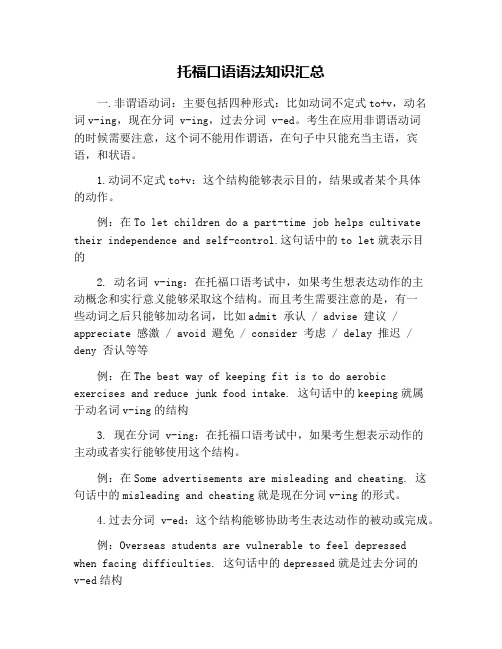
托福口语语法知识汇总一.非谓语动词:主要包括四种形式:比如动词不定式to+v,动名词v-ing,现在分词 v-ing,过去分词 v-ed。
考生在应用非谓语动词的时候需要注意,这个词不能用作谓语,在句子中只能充当主语,宾语,和状语。
1.动词不定式to+v:这个结构能够表示目的,结果或者某个具体的动作。
例:在To let children do a part-time job helps cultivate their independence and self-control.这句话中的to let就表示目的2. 动名词 v-ing:在托福口语考试中,如果考生想表达动作的主动概念和实行意义能够采取这个结构。
而且考生需要注意的是,有一些动词之后只能够加动名词,比如admit 承认 / advise 建议 / appreciate 感激 / avoid 避免 / consider 考虑 / delay 推迟 / deny 否认等等例:在The best way of keeping fit is to do aerobic exercises and reduce junk food intake. 这句话中的keeping就属于动名词v-ing的结构3. 现在分词 v-ing:在托福口语考试中,如果考生想表示动作的主动或者实行能够使用这个结构。
例:在Some advertisements are misleading and cheating. 这句话中的misleading and cheating就是现在分词v-ing的形式。
4.过去分词 v-ed:这个结构能够协助考生表达动作的被动或完成。
例:Overseas students are vulnerable to feel depressed when facing difficulties. 这句话中的depressed就是过去分词的v-ed结构二. 虚拟语气:在托福口语考试中,考生如果想表示自己所说的话并不是事实,而是假设、愿望、怀疑、或推测等等,能够采用这个结构。
托福考试语法结构知识点

托福考试语法结构知识点托福考试是一个评估非英语母语者英语能力的标准化测试,其中语法结构是考试的一个重要部分。
掌握语法结构的知识点对于正确理解和运用英语语言至关重要。
本文将介绍托福考试中常见的语法结构知识点,帮助考生更好地备考。
一、动词时态和语态1. 一般现在时:用于陈述普遍事实、经常重复的动作或客观真理。
例如:Water boils at 100 degrees Celsius.2. 一般过去时:用于过去发生的动作或状态。
例如:I watched a movie yesterday.3. 现在进行时:表示正在进行的动作或现阶段的状态。
例如:She is reading a book now.4. 过去进行时:表示过去某一时刻正在进行的动作。
例如:They were studying when I called them.5. 将来时态的使用:用于表示将来的动作或状态。
例如:I will go to the party tomorrow.6. 被动语态:用于强调动作的接受者而不是执行者。
例如:The book was written by Mark Twain.二、主谓一致1. 单复数主谓一致:主语是单数时,谓语动词要用单数形式;主语是复数时,谓语动词要用复数形式。
例如:She walks to school every day. They walk to school every day.2. 近距离主谓一致:当主语和谓语之间有介词短语或从句时,要根据主语而不是介词短语或从句来确定谓语动词的单复数形式。
例如:The book, along with its companion, is on the shelf.三、条件句1. 第一型条件句:表示真实条件和其可能的结果。
例如:If it rains,I will stay at home.2. 第二型条件句:表示对现在或未来假设的不太可能或不可能的条件及其可能的结果。
雅思写作之常用的语法句型
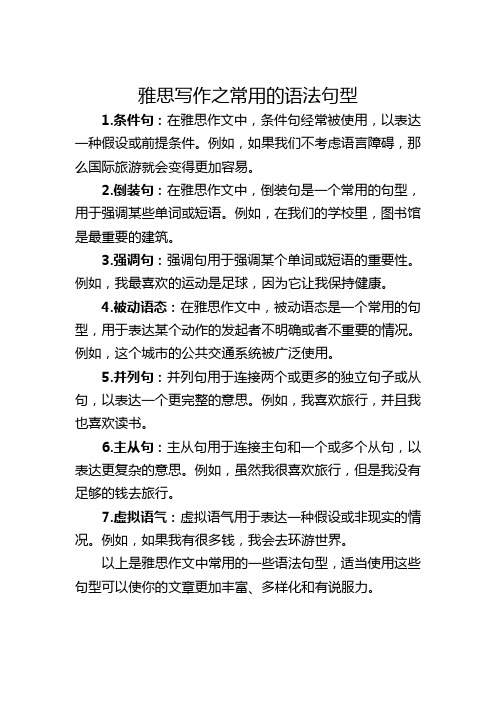
雅思写作之常用的语法句型
1.条件句:在雅思作文中,条件句经常被使用,以表达一种假设或前提条件。
例如,如果我们不考虑语言障碍,那么国际旅游就会变得更加容易。
2.倒装句:在雅思作文中,倒装句是一个常用的句型,用于强调某些单词或短语。
例如,在我们的学校里,图书馆是最重要的建筑。
3.强调句:强调句用于强调某个单词或短语的重要性。
例如,我最喜欢的运动是足球,因为它让我保持健康。
4.被动语态:在雅思作文中,被动语态是一个常用的句型,用于表达某个动作的发起者不明确或者不重要的情况。
例如,这个城市的公共交通系统被广泛使用。
5.并列句:并列句用于连接两个或更多的独立句子或从句,以表达一个更完整的意思。
例如,我喜欢旅行,并且我也喜欢读书。
6.主从句:主从句用于连接主句和一个或多个从句,以表达更复杂的意思。
例如,虽然我很喜欢旅行,但是我没有足够的钱去旅行。
7.虚拟语气:虚拟语气用于表达一种假设或非现实的情况。
例如,如果我有很多钱,我会去环游世界。
以上是雅思作文中常用的一些语法句型,适当使用这些句型可以使你的文章更加丰富、多样化和有说服力。
雅思写作语法总结(简洁全面)
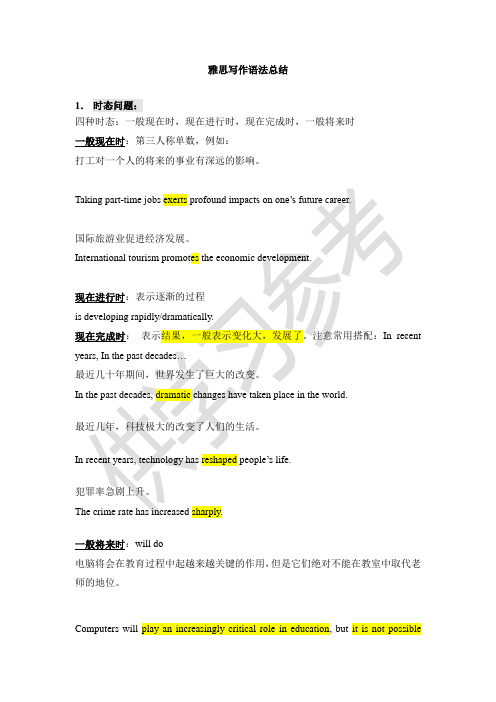
雅思写作语法总结1.时态问题:四种时态:一般现在时,现在进行时,现在完成时,一般将来时一般现在时:第三人称单数,例如:打工对一个人的将来的事业有深远的影响。
Taking part-time jobs exerts profound impacts on one’s future career.国际旅游业促进经济发展。
International tourism promotes the economic development.现在进行时:表示逐渐的过程is developing rapidly/dramatically.现在完成时:表示结果,一般表示变化大,发展了。
注意常用搭配:In recent years, In the past decades…最近几十年期间,世界发生了巨大的改变。
In the past decades, dramatic changes have taken place in the world.最近几年,科技极大的改变了人们的生活。
In recent years, technology has reshaped people’s life.犯罪率急剧上升。
The crime rate has increased sharply.一般将来时:will do电脑将会在教育过程中起越来越关键的作用,但是它们绝对不能在教室中取代老师的地位。
Computers will play an increasingly critical role in education, but it is not possiblethat they could replace teachers in the classroom.2.语态问题:主动为主,搭配被动。
常见被动语态结构:be doneAm, is, are doneIs being doneHave/has been doneWill be donePriorities should be given to education.3.词法问题:名词:泛指的名词要用复数,不加冠词。
雅思考试之必备语法知识

雅思考试之必备语法知识雅思考试主要考察的是考生的语言应用能力,所以语法不是唯一的标准。
但是,学会一些基础的语法知识可以帮助考生更好地理解和使用英语,从而在考试中更准确地表达自己的意思。
以下是一些在雅思考试中可能会用到的语法知识。
1.主语和谓语在英语中,每个句子都有主语和谓语,主语通常是人或事物,而谓语则是描述主语的动作或状态。
例如,“I am studying”(我正在学习)中的主语是“I”,谓语是“am studying”。
2.动词时态和语态动词时态表示动作发生的时间,如现在、过去或未来;语态则表示动作的执行者是谁,例如主动或被动。
例如,“I am studying”(我正在学习)中的动词“am studying”是现在进行时态,表示动作正在进行。
3.名词和代词名词表示人、事物、地点等概念,而代词则代替名词或名词词组,以避免重复。
例如,“I like dogs”(我喜欢狗)中的“dogs”是名词,“I”是代词。
4.形容词和副词形容词和副词用来描述名词或代词的特征、状态或动作。
例如,“She is beautiful”(她很漂亮)中的“beautiful”是形容词,用来描述“她”的外貌特征。
5.介词短语和从句介词短语通常表示位置、时间、原因等关系,从句则是用完整的句子来做为另一个句子的成分。
例如,“I am studying in the library”(我在图书馆学习)中的“in the library”是介词短语,表示“我”所在的位置,“I am studying”是从句,作为整个句子的主语和谓语。
总的来说,学会这些基础的语法知识可以帮助考生更好地理解和使用英语,从而在考试中更准确地表达自己的意思。
但是,考试题目的难易程度和具体内容也会影响语法的出现频率和分布,所以考生还需要广泛阅读和积累词汇。
托福考试有哪些重要的语法
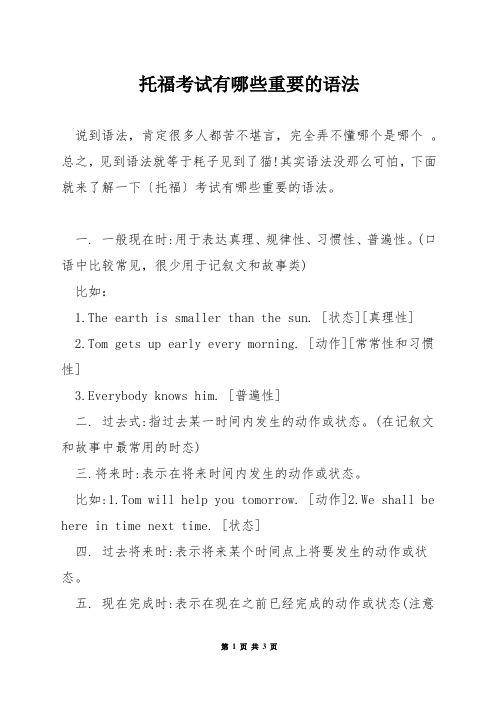
托福考试有哪些重要的语法说到语法,肯定很多人都苦不堪言,完全弄不懂哪个是哪个。
总之,见到语法就等于耗子见到了猫!其实语法没那么可怕,下面就来了解一下〔托福〕考试有哪些重要的语法。
一. 一般现在时:用于表达真理、规律性、习惯性、普遍性。
(口语中比较常见,很少用于记叙文和故事类)比如:1.The earth is smaller than the sun. [状态][真理性]2.Tom gets up early every morning. [动作][常常性和习惯性]3.Everybody knows him. [普遍性]二. 过去式:指过去某一时间内发生的动作或状态。
(在记叙文和故事中最常用的时态)三.将来时:表示在将来时间内发生的动作或状态。
比如:1.Tom will help you tomorrow. [动作]2.We shall be here in time next time. [状态]四. 过去将来时:表示将来某个时间点上将要发生的动作或状态。
五. 现在完成时:表示在现在之前已经完成的动作或状态(注意不要包括现在)。
六. 过去完成时:表示在过去某个时间之前完成的动作或状态。
比如:Three days ago he had already finished his homework. [动作]七. 将来完成时:表示将来某个时间之前将要完成的动作或状态。
比如:Tomorrow morning, I will have cleaned the windows. [动作]八. 过去将来完成时:表示在过去的某个时间之前应该完成的动作或状态。
(一般用于虚拟语气)比如:If he were alive, he would have been a doctor now.[状态][实际状况是他已经去世,所以永远成不了医生]九.现在进行时:从现在开始,并持续进行一段时间。
(注意只能使用连续动词)。
比如:Lei is reading a book.十. 过去进行时:在过去的某一时间前开始,并持续进行一段时间。
托福语法知识总览

托福语法知识总览托福(Test of English as a Foreign Language)是评估非英语为母语的人士的英语语言能力的考试。
其中,语法作为其考试的一个重要组成部分,对于考生来说十分关键。
本文将为大家总览托福语法知识,旨在帮助考生提高对语法的理解和应用。
一、动词时态动词时态在托福考试中经常被考察。
以下是几种常见的时态:1. 一般现在时:表示当前情况或普遍真理。
例如:The sun rises in the east.译文:太阳从东方升起。
2. 过去时:表示已经发生的事情或过去的经历。
例如:I went to the park yesterday.译文:昨天我去了公园。
3. 现在进行时:表示当前正在进行的动作。
例如:They are studying for the exam.译文:他们正在为考试而学习。
4. 一般将来时:表示将来某个时间会发生的事情。
例如:She will travel to Europe next month.译文:她下个月将去欧洲旅行。
二、名词名词是英语语法中的核心部分之一。
这里列举几种常见的名词用法:1. 单数名词:表示一个人、物或概念。
例如:I have a cat.(我有一只猫。
)2. 复数名词:表示多个人、物或概念。
例如:They have two cars.(他们有两辆车。
)3. 不可数名词:表示无法分为单个单位的物质或抽象概念。
例如:I need some advice.(我需要一些建议。
)4. 可数/不可数名词的区分:可数名词与不可数名词之间的区分在很多情况下会影响到名词前面的冠词和数量词的使用。
例如:I ate an apple.(我吃了一个苹果。
)I drank some water.(我喝了一些水。
)三、代词代词在托福考试中也是一个常见的考点。
以下是几种重要的代词:1. 主格代词:用于主语的位置。
例如:He is my friend.(他是我的朋友。
新托福考试核心语法
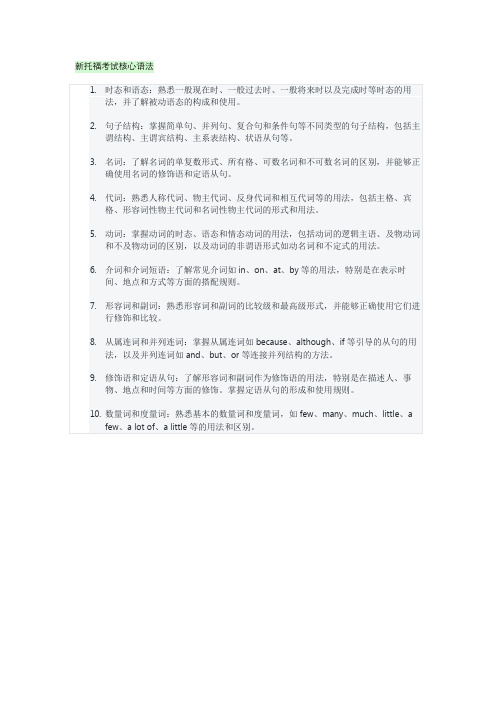
8.从属连词和并列连词:掌握从属连词如because、although、if等引导的从句的用法,以及并列连词如and、but、or等连接并列结构的方法。
9.修饰语和定语从句:了解形容词和副词作为修饰语的用法,特别是在描述人、事物、地点和时间等方面的修饰。掌握定语从句的形成和使用规则。
10.数量词和度量词:熟悉基本的数量词和度量词,如few、many、much、little、a few、a lot of、a little等的用法和区别。
4.代词:熟悉人称代词、物主代词、反身代词和相互代词等的用法,包括主格、宾格、形容词性物主代词和名词性物主代词的形式和用法。
5.动词:掌握动词的时态、语态和情态动词的用法,包括动词的逻辑主语、及物动词和不及物动词的区别,以及动词的非谓语形式如动名词和不定式的用法。
6.介词和介词短语:了解常见介词如in、on、at、by等的用法,特别是在表示时间、地点和方式等方面的搭配规则。
新托福考试核心语法
1.时态和语态:熟悉一般现在时、一般过去时、一般将来时以及完成时等时态的用法,并了解被动语态的构成和使用。
2.句子结构:掌握简单句、并列句、复合句和条件句等不同类型的句子结构,包括主谓结构、主谓宾结构、主系表结构、状语从句名词和不可数名词的区别,并能够正确使用名词的修饰语和定语从句。
- 1、下载文档前请自行甄别文档内容的完整性,平台不提供额外的编辑、内容补充、找答案等附加服务。
- 2、"仅部分预览"的文档,不可在线预览部分如存在完整性等问题,可反馈申请退款(可完整预览的文档不适用该条件!)。
- 3、如文档侵犯您的权益,请联系客服反馈,我们会尽快为您处理(人工客服工作时间:9:00-18:30)。
雅思常考的15种语法现象
一、动词时态及语态题
1、The manager told us that this factory was built in 1958.
2、By the time we got there, the play had already begun.
3、When I was a child, I knew that the earth turns about its axis.
4、When Mr.Delay got home after a day’s exhausting work, his wife and children were sleeping.
二、非谓语动词题
1、The film showed last night was very moving.
2、Having finishing his lecture, the teacher asked if anyone wished to asked a question.
3、The problem being discussed is very important.
4、Given more time, we are sure to finish it.
5、Will you please make yourself known to everyone here?
三、It作形式主语及形式宾语题
1、It is difficult to study English well.
2、We think it is important to pass the exam.
四、强调句型
1、It was at an evening party that I first saw her.
2、It is what you will do that is important.
3、When was it that he bought a new car?
五、倒装句型
全部倒装句
1、Stop talking! There comes the teacher.
部分倒装句
1、So badly was he hurt in the accident that he had to be sent to hospital.
2、Not only does he study well, but also he is always ready to help others.
3、Mary has done well in the English exam. So she has. She always does well in the exam.
六、从句中选择关系词题
1、It was in so friendly a way that he talked with us.
2、Oct.15, 2005 is a day when we will take our English examination.
3、We want to buy the same book as you are reading.
4、The sun heats the earth, which is very important to living things.
七、虚拟语气
1、I would have done it better if I had had more time.
2、I wish you would go with us tomorrow.
3、I suggest that we (should )adopt a different policy.
4、Had it not been for your help, we would never have been able to get over the difficulties.
八、情态动词题
1、The ground is so wet, it must have rained last night.
2、She must be a doctor, I think.
3、I should have called you last week, but I was too busy then.
九、几组形容词及副词区别题(注意比较级、最高级、倍数表达; likely/possible/probable; worth/worthy; too much/much too; already/yet等)
1、His books are three time as many as my books.
2、The Nile river is the longest river in the world.
3、It is much too hot tonight.
4、The harder he worked, the happier he felt.
十、主谓一致题
1、The moral of the officers and crew was very high.
2、Each boy and each girl in the city is asked to go to school.
3、Neither the quality nor the prices have changed.
十一、动词及动词词组区别题
1、Can you tell the difference between these two words?
2、He joined the army three years ago.
十二、主句用将来时,从句则用一般现在时(或现在完成时)表将来题
1、They will leave the classroom when they have finished writing.
2、We will start to work as soon as our teacher comes.
十三、名词后面有限定时则该名词前一定要加定冠词the题
1、Beijing is the capital of China.
2、He can’t have the expience of all of the world.
十四、常用介词区别题(如on, in, except /besides, within, without, through等)
1、You should write in ink not with your pencil.
2、He pulled her into the train by the arm.
3、by bus/train/air…. On foot, on the farm, in the morning/afternoon/evening, at night/noon
十五、常考代词题(常考的有other/others, another/the other; sometimes/some time/sometime; that/which; that/what, either/neither/or; too/also/either; many/much/a great deal of/a great number of/a great amount of; a few/few/little/a little; as long as/as far as; so long as/so far as )
1、That you don’t like him is none of my business.
2、The weather in the north is much colder than that in the south in January.
3、He must be a worker. I think so.。
